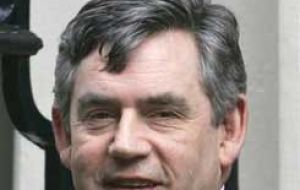MercoPress. South Atlantic News Agency
PM Brown pledged to clean up the financial system
 Brown said the priority is to ensure financial stability
Brown said the priority is to ensure financial stability Gordon Brown has pledged to “clean up” the financial system following the rescue of Britain's biggest mortgage lender HBOS by Lloyds TSB. The prime minister said he had taken “quick action” to “maintain the stability of the financial system”.
But he said he also had proposals to end "irresponsible behavior" in the money markets to prevent similar problems happening in the future. Mr Brown was speaking before the FSA announced a clampdown on short-selling. The government by-passed competition laws to allow the HBOS takeover to happen. The £12.2bn deal will create a mega bank that will dwarf its nearest rivals in the UK mortgage and savings market. It follows the dramatic collapse in the share price of HBOS, amid fears it was exposed to bad debt. The takeover is unlikely to have been allowed by the Competition Commission under normal circumstances. But the government says it will allow the deal as financial stability "must trump" competition fears. Chancellor Alistair Darling added that without the deal the outlook was "very bleak indeed" though he denied the authorities had rushed through the deal. Mr Brown said the government's main priority in the short-term was to ensure the stability of the financial system. But in the longer-term, he said there would be reforms of the financial system to prevent future problems. He told the BBC: "I think we've got to look at where there has been irresponsible behavior and I've said for some time that we need reforms in the system. "I believe there's now an audience that agrees with me that we should do more. "We've got to clean up the financial system; we don't want these problems recurring in the future. "I proposed a number of things to our international colleagues because this is global action that is needed to deal with a global problem, and in our own country we'll do whatever is necessary to make sure that people have confidence both in the system and we restore the prosperity of the country." Banks in trouble will be forced to disclose their debts to the Financial Services Authority, the Bank of England and the Treasury under proposed new legislation. The Banking Reform Bill, due to become law in the next Parliamentary session, will also allow the Bank of England to act more quickly to take over ailing banks. The government also backs international moves to allow central banks to intervene more heavily in the banking system. Mr Brown has been calling for the establishment of an international early warning system to ensure future credit crunches are identified and dealt with before the effects spread. In a foreign policy speech in May, he urged the US to join him in pushing for reform of the major international institutions including the IMF and World Bank. But there are no signs Mr Brown will follow the lead of the US financial regulators and curb "short-selling" - the practice which allows speculators to profit from falling share prices, which critics say fuels financial instability. Some of Mr Brown's domestic plans are also likely to be opposed by the banks themselves, who fear shareholders in troubled institutions could be stripped of their rights. The Conservatives have said they will support government legislation to reform the system - but they also want to go further and hand the regulation of the banks back to the Bank of England. Shadow chancellor George Osborne said the Conservatives would also consider rules to smooth out the "credit cycle" to prevent banks lending too much in good economic times and not enough when things turn bad. Vince Cable, the Lib Dem Treasury spokesman, has been pressing for banking reform and tougher controls on lending for years. He has urged the end of "lavish" City bonuses and predicted the era of "freewheeling" financial markets was coming to an end.(BBC)




Top Comments
Disclaimer & comment rulesCommenting for this story is now closed.
If you have a Facebook account, become a fan and comment on our Facebook Page!